
December, 2024 – Issue 15
Welcome to The CLEO JD Report. We will share tips on how to prepare for and succeed in law school, provide legal profession insights from our CLEO alumni, and spotlight our Partners-In-Law law schools that are making a commitment to diversity, equity, and inclusion.
The Council on Legal Education Opportunity, Inc. (CLEO): is a 501(c)(3) national non-profit organization that was founded in 1968 to expand opportunities for underrepresented students to attend law school. Since its inception, more than 32,000 students have participated in CLEO’s programs and joined the legal profession.

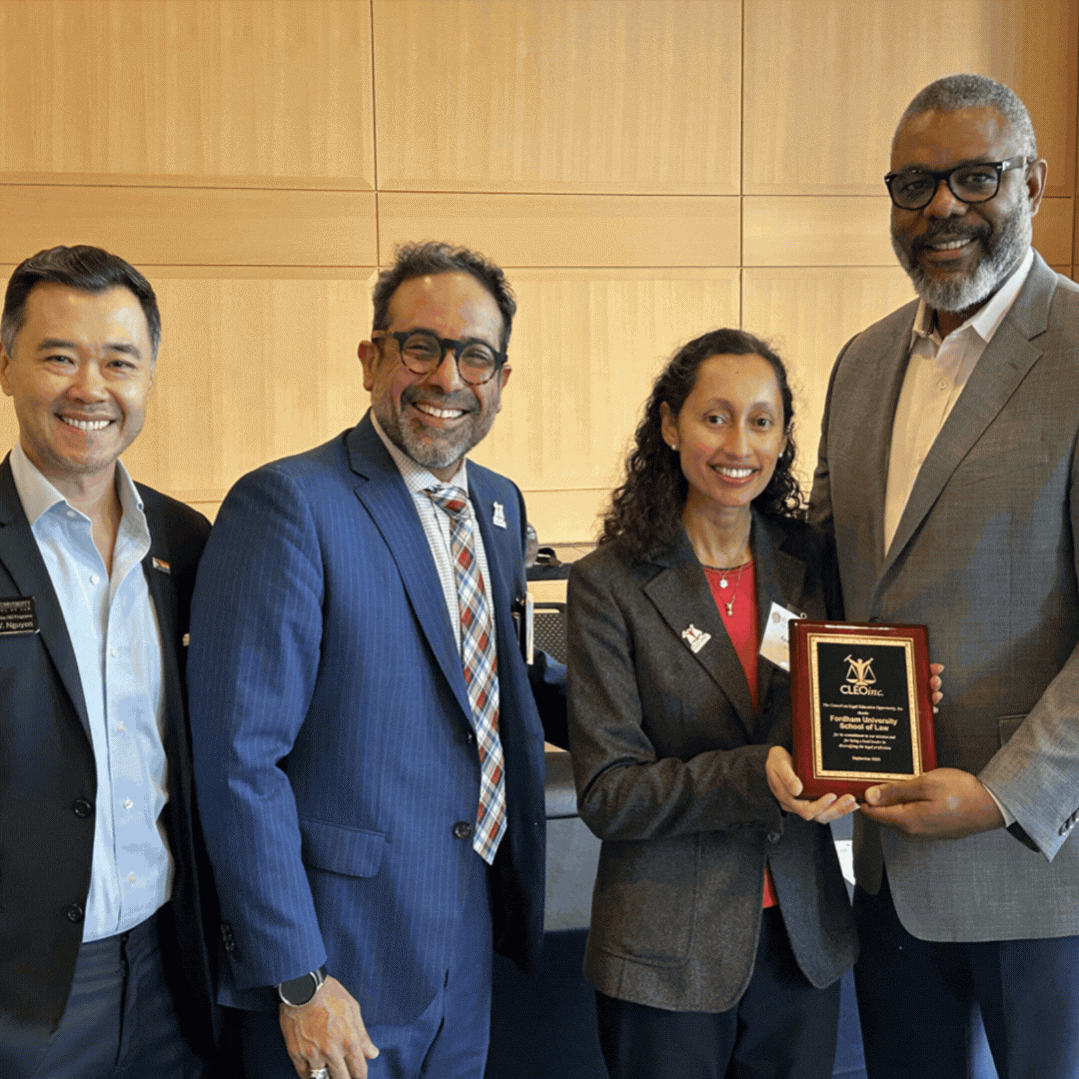
CLEO CEO J.C. Polanco, and Lynda Cevallos, CLEO VP of Academic Affairs, were in attendance at the Fordham University School of Law student Welcome session with Kimathi Gordon-Somers, Esq. Assistant Dean of Student Affairs.
CLEO recognized Fordham for their commitment to access and opportunity and for working with CLEO to ensure that future lawyers are ready!
Lynda Cevallos, Esq., CLEO Vice President of Academic Affairs, was recently recognized for her dedication and support for aspiring Black legal professionals by the National Black Pre-Law Conference.
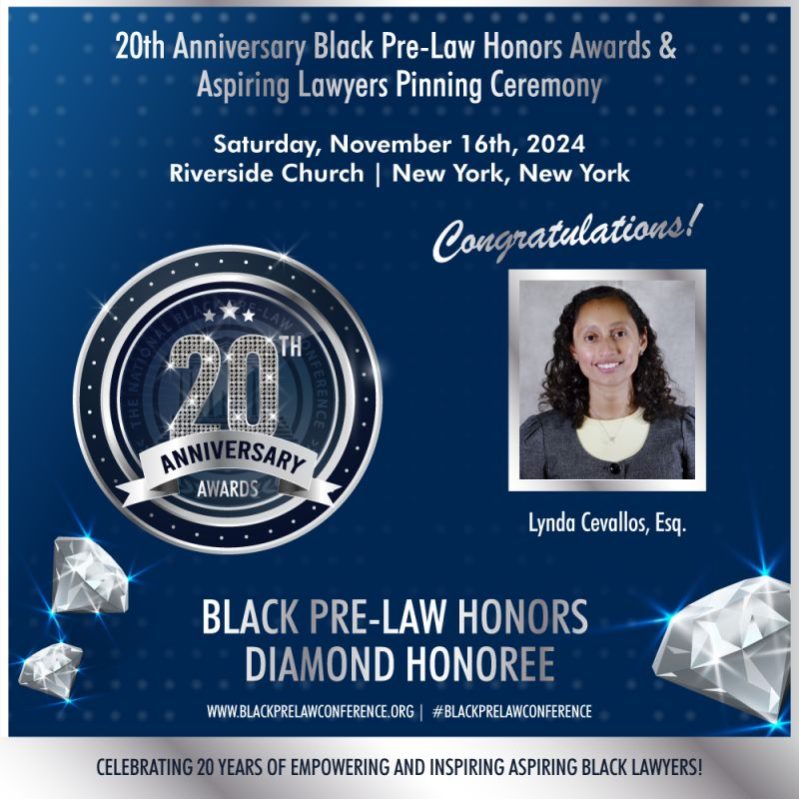

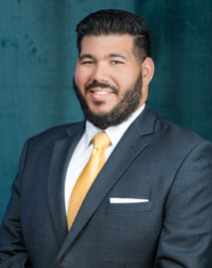
Read Secrets of a Law Student’s success & how CLEO can help YOU!
Edward J. Bryant
Penn State Dickinson Law
Class of 2027
Q1. What was your course of study in college?
I studied Physics in undergrad, focusing on near-space atmospheric research.
Q2. How did you become interested in pursuing law?
After founding my Notary Services company in New York City, I worked closely with attorneys and law firms. I was fortunate to experience mentorship and guidance from the various professional connections I made while acting as CEO. I was motivated to pursue law after witnessing the professionalism and legal expertise displayed by New York City’s top attorneys.
Q3. What steps did you take to prepare for law school?
The LSAT was a difficult task for me because I did not study humanities-related subjects in undergrad. LSAT 7Sage was game changer because of its ease of use, and the method of instruction was tailored to fit the schedule of a working professional, or busy student.
Q4. How did you find out about CLEO?
I was recommended to apply to CLEO by one of my law school recommenders from undergrad. She is also a CLEO alum and spoke about the program with reverence and enthusiasm.
Q5. What benefits did you receive by participating in the CLEO Pre-Law Summer Institute or 1L-Prep Attitude is Essential?
CLEO’s Pre-Law Summer Institute prepared me for the practical challenges that the average 1L faces as they begin their law school journey. I learned how to brief cases, create outlines, be prepared to engage in class using the Socratic method, and importantly, gave me the tools to succeed as a great legal writer.
Q6. What helped you cope with the stress of law school?
Sleep regulation is crucial to success as a 1L. Understanding and accepting your limitations will inevitably prepare you to adapt to the law school environment. Studying is important, but personal time is absolutely necessary to balance the expectations and pressures of law school.
Q7. After law school, what are your legal career plans?
I wish to focus my practice in FinTech and emerging financial technologies like blockchain or DeFi. I hope to help firm navigate the novel legal challenges that face the financial sector precipitated by the proliferation of cryptocurrency and their related technologies.
Q8. Do you volunteer or intern with any legal organizations?
I am currently a student member of the Pennsylvania Bar Association, the New York Bar Association, the New York City Bar Association, and the Cumberland County Bar Association. All these bar associations offer ample opportunity to serve my local community, and beyond. I have participated in law-student section events in my jurisdiction and hope to expand my participation to more sections and groups in the coming year.
Q9. Do you have any advice for future lawyers?
While you’re in law school, learn the law, excel at legal analysis, but keep in mind that being a lawyer is a people-first business. There is much value in cultivating relationships with your fellow colleagues. Money is a motivation, but should not be your only motivator as it can stifle seeking prospective legal opportunities that may ultimately be the best fit for your law career.
Q10. What motivates you to be part of the legal profession?
I am inspired by the scholarship produced by the attorneys who instruct me every day. Learning from the brightest minds in the legal profession is a privilege. I look forward to stepping into the footsteps of the many attorneys who have come before me. Finding solutions to the challenges my future clients continue to be a huge motivating force for me.
An Encouraging Word from (our student highlight):
Getting into law school is hard, but once you’re here, pay it forward. It is privilege to be part of this profession, and it is every young lawyer’s responsibility to carry themselves with the highest degree of professionalism and decorum. Treat yourself with respect first, and all those persons in your orbit fill follow you’re lead. Learn the law, but more importantly, learn to be a better human.

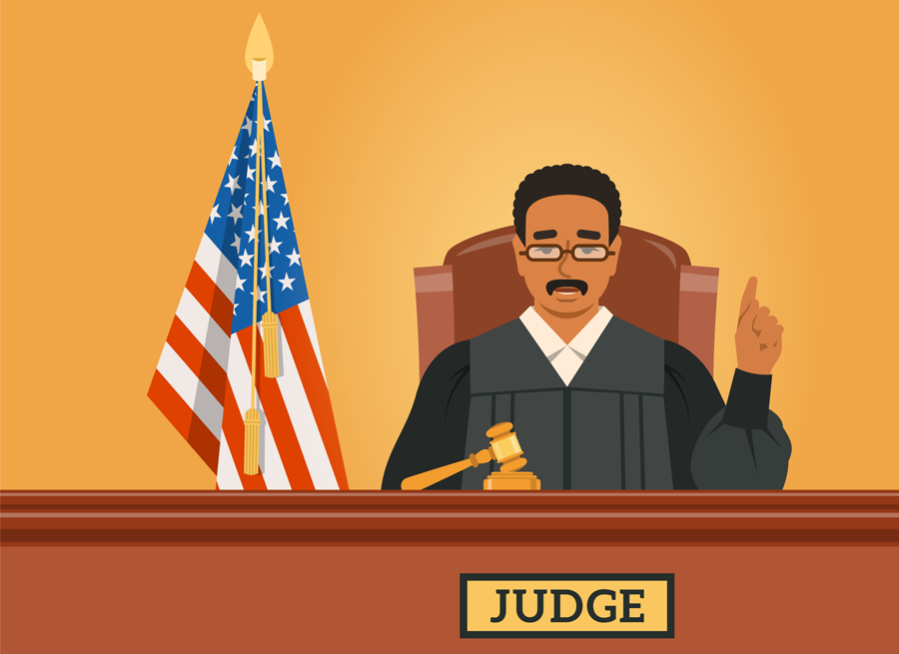
By Bernie Chimner, Co-Founder & LSAT Instructor, GriffonPrep (www.GriffonPrep.com)
In a court, the judge has a rule:
“Every case file with a red cover must contain a guilty verdict.”
There are four case files on the table:
- A file with a red cover (you can’t see inside).
- A file with a green cover (you can’t see inside).
- A file with a guilty verdict (you can’t see the cover).
- A file with a not guilty verdict (you can’t see the cover).
Question: Which case files do you need to check to determine whether the judge’s rule is being followed?
You must check case files #1 and #4. It is not necessary to check #2 or #3, since the rule is that “every case file with a red cover must contain a guilty verdict”, not that “every guilty verdict must have a red cover.” In other words, green files with guilty verdicts would still be allowed while following the judge’s rule. What cannot happen, given the judge’s rule, is a red file with a not guilty verdict, which is why you must check both #1 and #4 — file #1 to make sure that the verdict is guilty and #4 to make sure that the cover is not red.

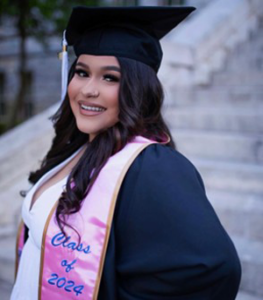
Read Secrets of a Pre-Law Student’s success & how CLEO can help YOU!
Megan Ali Montoya
St. Edward’s University
Austin, Texas – Class of 2024
Q1. How did you find out about CLEO?
I conducted a Google search on Pre-Law programs while I was a senior in college and I [came] across CLEO, which I was immediately impressed with, so I registered for one of its programs.
Q2. When did you realize you wanted to attend law school?
Unfortunately, my best friend was murdered in my freshman year of college, and I decided I wanted to attend law school to practice criminal law and become a prosecutor.
Q3. What did you learn during the CLEO program you attended?
I learned a lot about the law school application process from various law school admissions representatives that were speakers at the CLEO program.
Q4. How has the CLEO programs influenced your preparation for law school?
It helped me learn about different free resources that are available to study for the LSAT and helped me narrow my selection of law schools to apply to.
Q5. Select one of the CLEO programs (ASAP, JJ LSAT or CLEO Connection) you attended. What portion of that program was most beneficial to you and why?
I attended the CLEO Achieving Success in the Application Process (ASAP) program in Houston, Texas in the summer of 2024. Networking with other future law students was extremely beneficial to me because it allowed me to make some friends who are going through the same law school application process who I can reach out to for assistance and support.
Q6. Do you plan to attend any future CLEO events?
Yes, I plan on attending the 1L Prep-Attitude is Essential program and I will be applying for the Pre-Law Summer Institute.
Q7. Do you have any advice for other aspiring lawyers?
Start preparing and researching different law schools by at least your junior year of college. Also, you can major in anything before attending law school, so do not feel pressured to do the typical route of majoring in political science. Finally, start preparing for the LSAT several months in advance and take your time to select the best prep materials and/or course that will work best for your style of learning.
Q8. Do you have any additional comments about CLEO?
I highly recommend the CLEO’s Pre-Law programs to everybody who is interested in attending law school. All their programs are extremely informative, and they offer excellent Pre-Law programs.

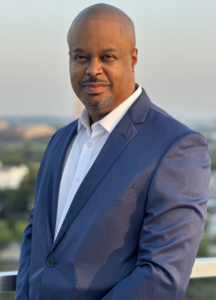
A Special Thank You to:
Leigh R. Allen, II
CLEO recognizes Leigh Allen II for his many years of dedicated service and impact at the organization!
Please read as Leigh shares his thoughts about his time at CLEO.
What accomplishments are you most proud of during your time here?
I feel very fortunate that I was able to work each day with such a dedicated, hard-working group of individuals. With that said, three accomplishments that I am very proud to have played an integral role in bringing to fruition for the organization, include:
- Creating the EDGE (Education, Diversity, and Greater Equality) acronym that, after 2018, became a ubiquitous association when people though of CLEO.
- The yearlong, nationwide 50th Anniversary celebration that took place in 2018, which recognized CLEO’s historic, half-century impact on the profession.
- The CLEO EDGE Honors Reception & Awards Program, which was first held in 2019 and has been hosted annually since then.
What has been the most rewarding part of your work and why?
Without question, assisting in the nurturing and development of numerous current and future legal advocates because it has, literally, helped “change the face” of the legal profession.
What advice would you give to students just starting out in the legal profession?
There are so many “wise words” that I’ve heard over the years from various sources, but, based on what I, myself, have come to believe are proven strategies, include, but are not limited to: seeking quality mentorship; networking with other professionals via associations and conferences; and committing to learning everything you can to become better in your role and whatever industry sector you may be working in.
What’s something about the organization that most people might not know, but that you think is important?
Probably a few things that could fit this bill, but, top of mind, even though we try and promote it pretty regularly, the fact that CLEO has helped enlighten more than 30,000 individuals about the legal profession since its inception.
What are some of the skills or lessons you’ve learned here that will stay with you forever?
There are several, but three that come to mind are: learning to be resourceful and judicious with finite resources and stretched budgets; the importance of teamwork; remaining steadfastly mindful of the organizational mission at all times.
What did you find most motivating about working at the organization?
Knowing that the service and programs we consistently delivered to our audience would have a lastingly beneficial impact on the legal profession and, thereby, society, as a whole, for, potentially, decades.
How do you think the organization has impacted the community or industry at large?
Succinctly stated, and as already mentioned, by “changing the face” of the profession to help make it more diverse, equitable, and inclusive.

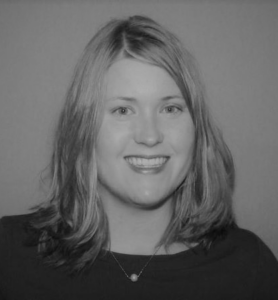
Maximizing Your Pre-Law Advisor
By Megan Pickens
Director, Pre-Law Advising Services at the University of Illinois Urbana-Champaign
President-Elect Midwest Association of Pre-Law Advisors
The Pre-Law path can feel daunting, creating feelings of insecurity and uncertainty. Seeking expert advice while navigating this path can offer welcome support, create confidence, and promote success. Pre-Law advisors are uniquely situated to provide this advice.
Pre-Law Advisors (PLAs) are designated members of the campus community tasked with supporting Pre-Law students. PLAs may be members of the faculty, career services offices, academic advising units, pre-professional advising teams, or part of a Pre-Law advising unit. PLAs are experts on advising students on a wide range of topics related to the undergraduate experience and Pre-Law journey.
Top Five Reasons to Utilize a Pre-Law Advisor (PLA):
- Expertise: PLAs attend conferences, engage in specialized trainings, participate in professional advising organizations, and actively develop their expertise in Pre-Law topics. They are also advising experts on their undergraduate campus. Additionally, PLAs have access to the most current trends and significant anticipated changes in the law admissions landscape. The evolving nature of the law admissions landscape means that lawyers, general advisors, and even current law students, are likely not the best-informed individuals to advise on the current law admissions process or the Pre-Law journey. PLAs are uniquely positioned to advise individuals in a holistic manner about the undergraduate experience, the Pre-Law journey and the most current aspects of the admissions process.
- Access: Advising services are a part of the benefits available to undergraduate students (and often alumni). These services are free and offer individual advising opportunities.
- Support: Many prospective law students do not have personal connection to individuals with knowledge of the legal profession or Pre-Law path. Utilizing PLAs can provide an important source of reassurance and confidence through each stage of the Pre-Law journey.
- Perspective: Each year PLAs support individuals with diverse goals, backgrounds and credentials. They engage with a wide range of individuals at various stages of the Pre-Law journey on various topics. Further, they can leverage these varied advising experiences to provide both global insights about the process as well as individually tailored guidance.
- Success: Utilizing a PLA increases your chances of achieving your goals and is a simple way to invest in your individual success both as an undergraduate student and beyond.
Top Five Topics to Discuss with a Pre-Law Advisor:
- Strategies & Goals – Seek honest and objective perspectives on academic, career, and admission plans. Relying only on online advice, subjective perspectives or generalized guidance, will not provide the individually tailored perspectives that a PLA can offer.
- Maximizing Your Undergraduate Experience – Ask about unique and challenging opportunities related to personal, professional, and academic development. Seek insights on setting strategic and meaningful individual goals.
- Exploring Your Interest in the Legal Profession – Ask how to explore the legal profession through curricular activities, alumni engagement, internships, special programs, and beyond. PLAs may also be able to provide first-hand perspectives!
- Resources Available to You – Ask about campus and non-campus resources related to academic support, personal development, professional opportunities, exploring legal careers, financing law school, and the law admissions process.
- Current Trends & Updates About the Legal Profession, Legal Education, and the Law Admissions Landscape – Ask regularly about current and anticipated changes relevant to the Pre-Law journey, being well informed is critical to success.
How to find my Pre-Law advisor?
- Research services at your undergraduate institution.
- Find your designated PLA through your LSAC account.
If your campus does not offer a designated PLA, reach out to the career center, academic advisors, or professors. Research Pre-Law events and programs hosted by law schools. Finally, engage with non-profit organizations that support individuals interested in the legal profession such as CLEO, AccessLex, and LSAC.


By joining the Bronx District Attorney’s Office, led by District Attorney Darcel D. Clark, you will be part of our mission to “Pursue Justice with Integrity” and achieve a safer Bronx through fair Justice.
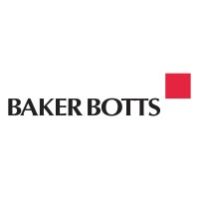
Baker Botts is an international law firm whose lawyers practice throughout a network of offices around the globe. Based on our experience and knowledge of our clients’ industries, we are recognized as a leading firm in the energy, technology and life sciences sectors.

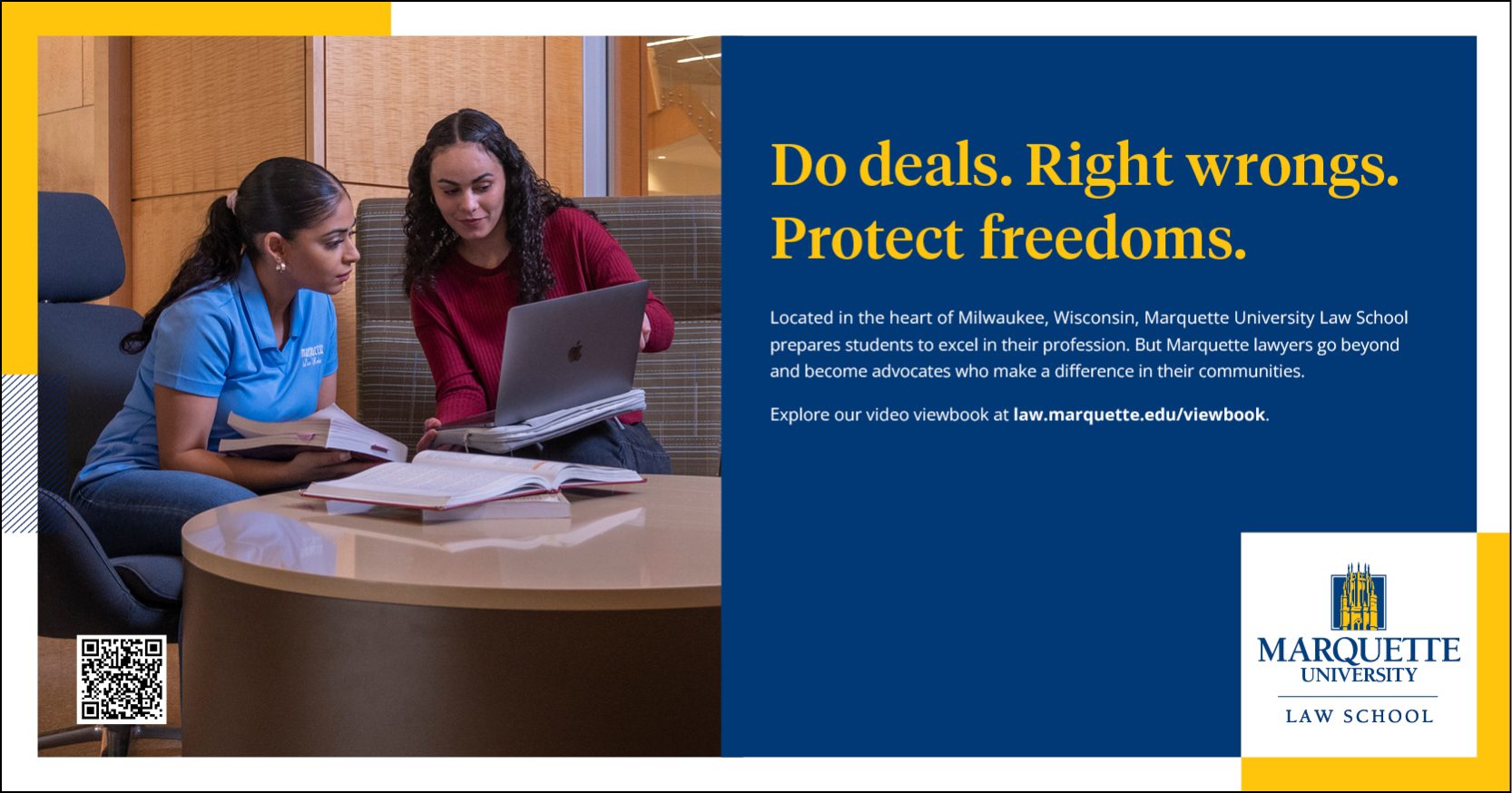
Marquette University
Law School
Do deals. Right wrongs. Protect Freedoms.
Marquette Law School hosts a series for JD students examining the impact of race on doctrinal 1L courses and legal practice areas (e.g. Contracts, Criminal Law, and Constitutional Law). The Law School participates in the State Bar of Wisconsin’s Diversity Clerkship Program, an initiative that places students in full-time summer employment in private law firms, corporate legal departments, and governmental agencies. The annual Marquette Lawyer/Student Diversity Reception is an invaluable networking opportunity for law students (and prospective students) to connect with diverse alumni and other members of the Wisconsin bar and bench. The Law School co-sponsors the annual Wisconsin Statewide Pre-Law Diversity Conference & Law Fair.
Visit Marquette University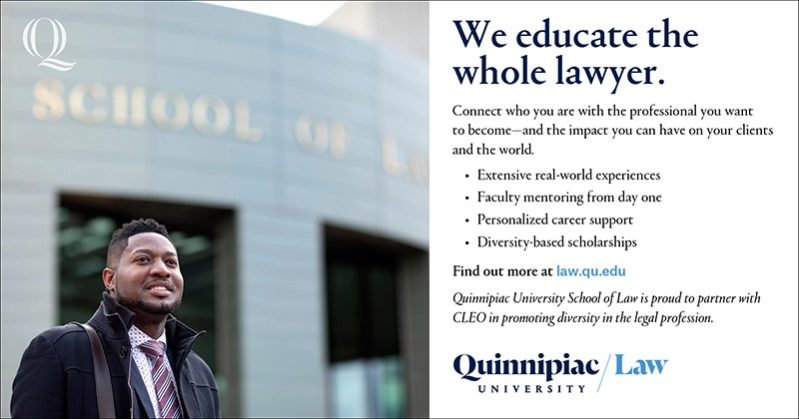
Quinnipiac University School of Law
Embraces Diversity, Equity, And Inclusion
At Quinnipiac Law, our mission is to create a diverse and inclusive community where every member is acknowledged, respected, and has the necessary resources to thrive, both individually and together. We incorporate inclusive excellence in everything we do to create a globally engaged, culturally rich and highly collaborative campus. Our policies and programs celebrate differences as sources of strength and empower everyone to embrace who they are and share their experiences, customs and beliefs. Our goal is to foster conversation, exposure and engagement with all people, thoughts, and ideas — from all corners of the world.
Visit Quinnipiac Law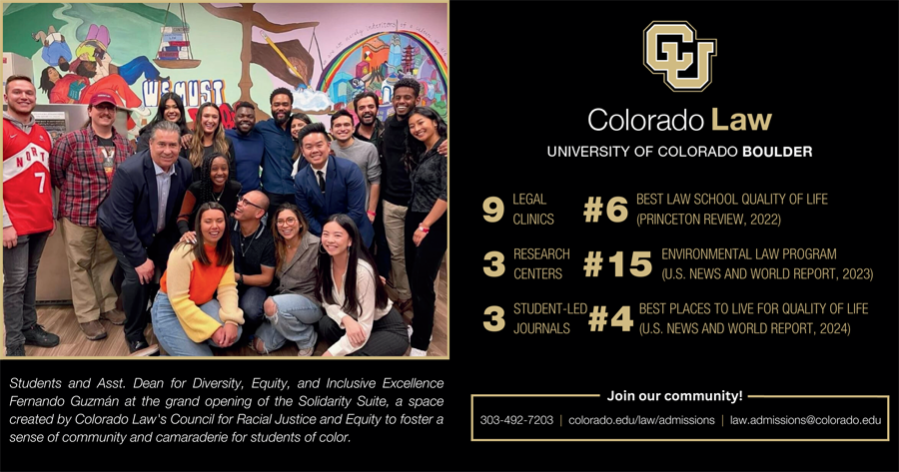
Colorado Law
University of Colorado Boulder
Colorado Law is strongly committed to Inclusiveness and Diversity
The institution works to "provide a supportive and diverse educational and scholarly community in a place that inspires vigorous pursuit of ideas, critical analysis, contemplation, and civic engagement in order to advance knowledge about the law in an open, just society". Through cultivating work opportunities and engaging in legal community initiatives, Colorado Law is demonstrating its dedication to a consistent and meaningful journey towards inclusivity and justice.
Visit Colorado Law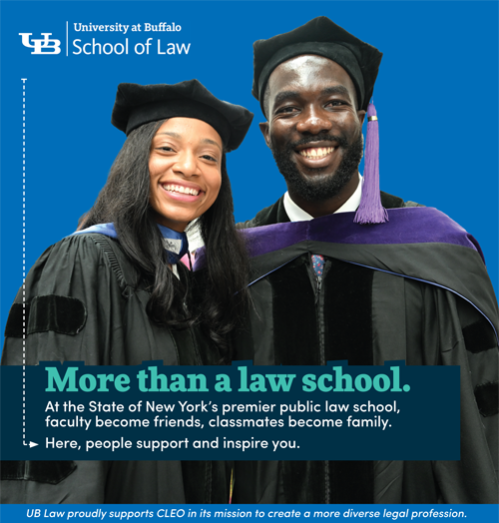
University at Buffalo
School of Law

CLEO, Inc. is proud to include many of the nation's premier law schools in our Consortium on Diversity in Legal Education.
PARTNER LAW SCHOOLS
Marquette University Law School
University of Colorado Law School
The University of Mississippi School of Law
University of New Hampshire School of Law
Quinnipiac University School of Law
Vermont Law and Graduate School
Washburn University School of Law
SUPPORTING LAW SCHOOLS
University at Buffalo School of Law
SUSTAINING LAW SCHOOLS
Boston College of Law
Mitchell Hamline School of Law
New York University School of Law
Southern Illinois University School of Law
A Special Thank You to our Newest and Renewing Consortium Members:
Boston College of Law & University at Buffalo School of Law!
CLEO STAFF
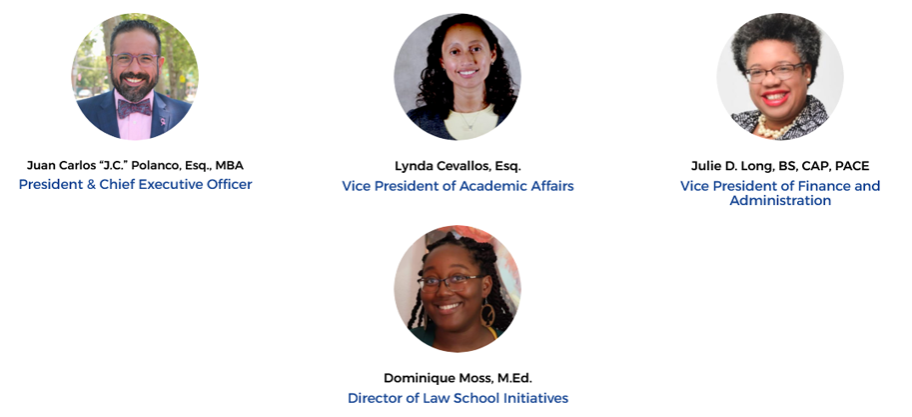
CLEO BOARD OF DIRECTORS
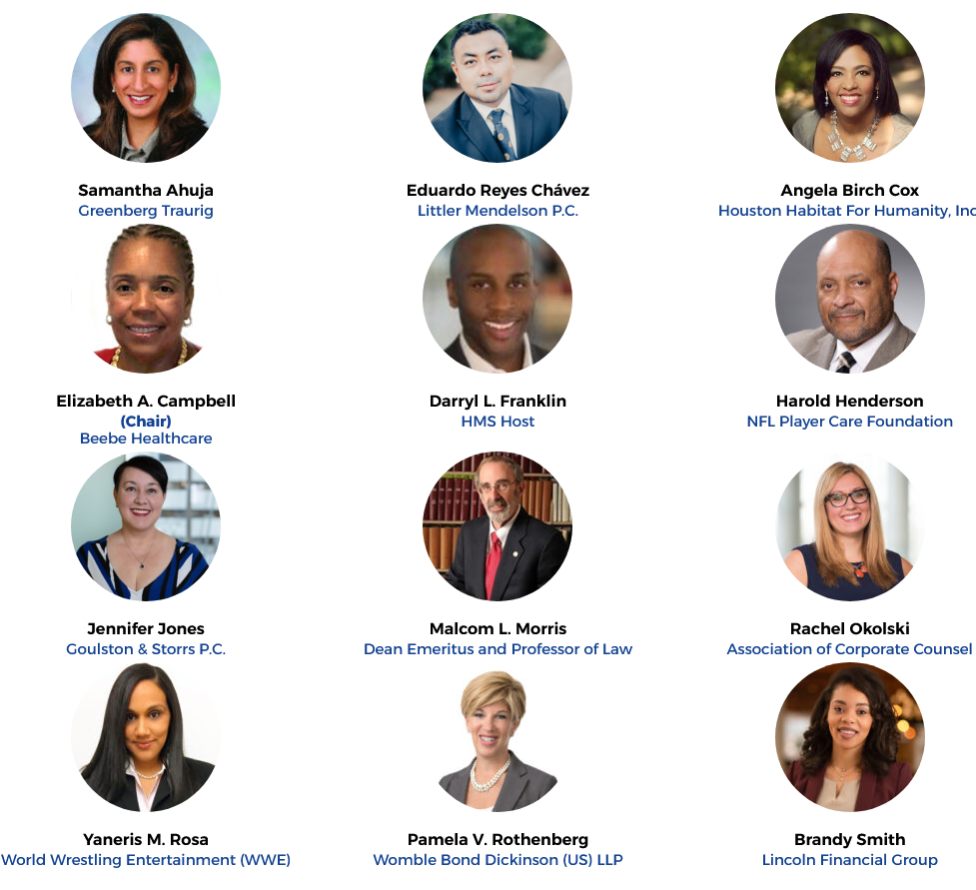
CLEO ADVISORY COUNCIL
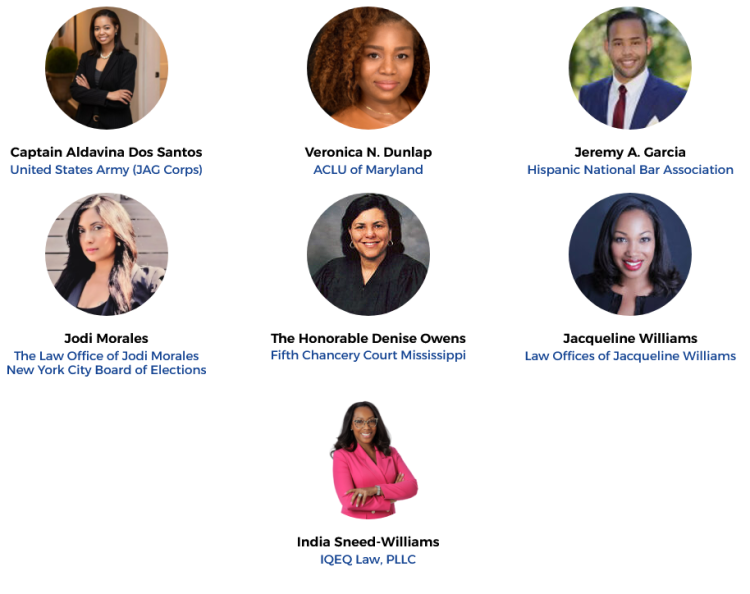


Did you know that your contribution directly helps a student achieve their dream of attending law school?
Each donation you make paves the way for student success. Together, we can empower a new generation of trailblazers!
Visit our DONATE page to see what your gift can do for a student and CLEO IT FORWARD! today.
